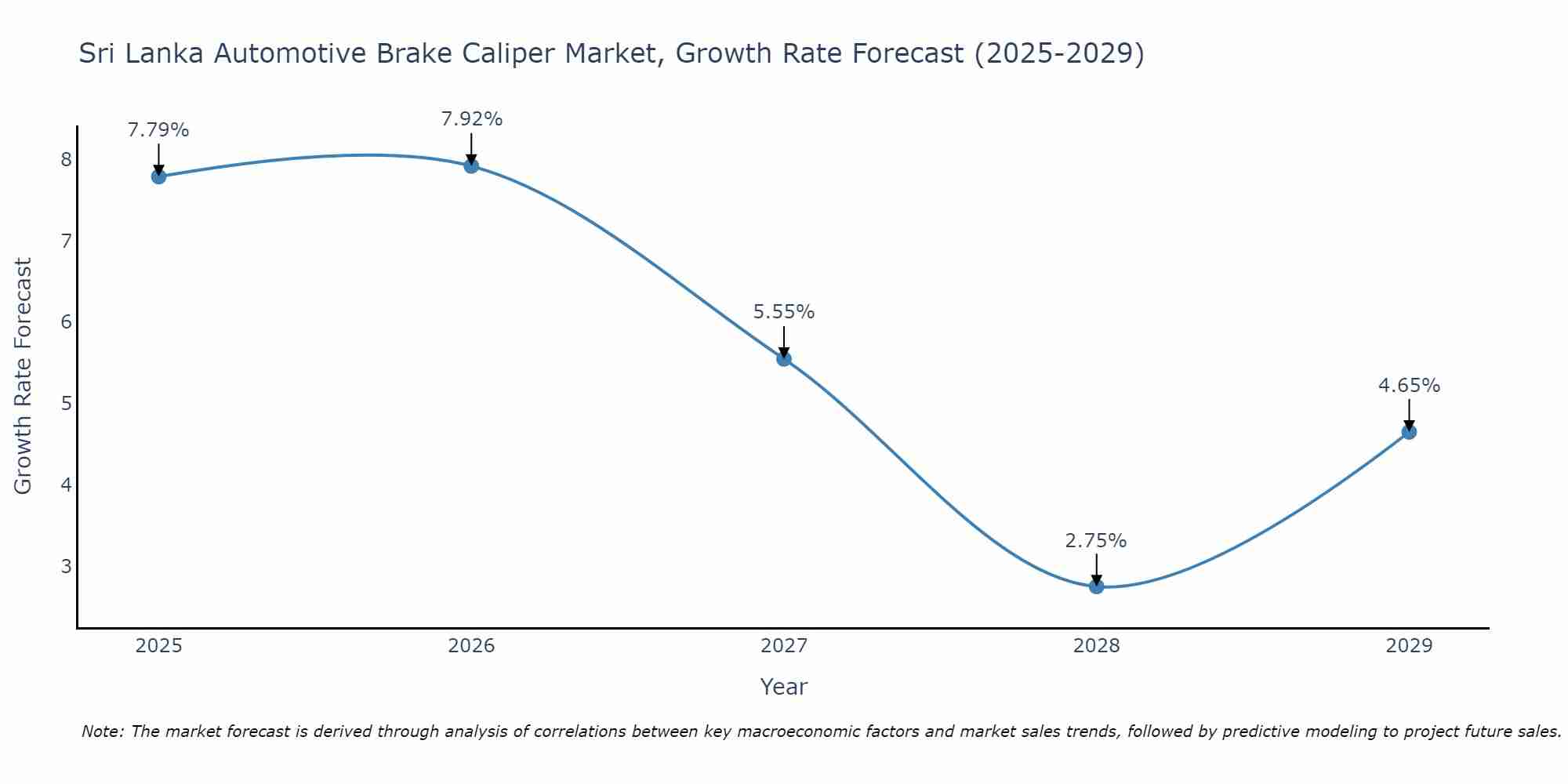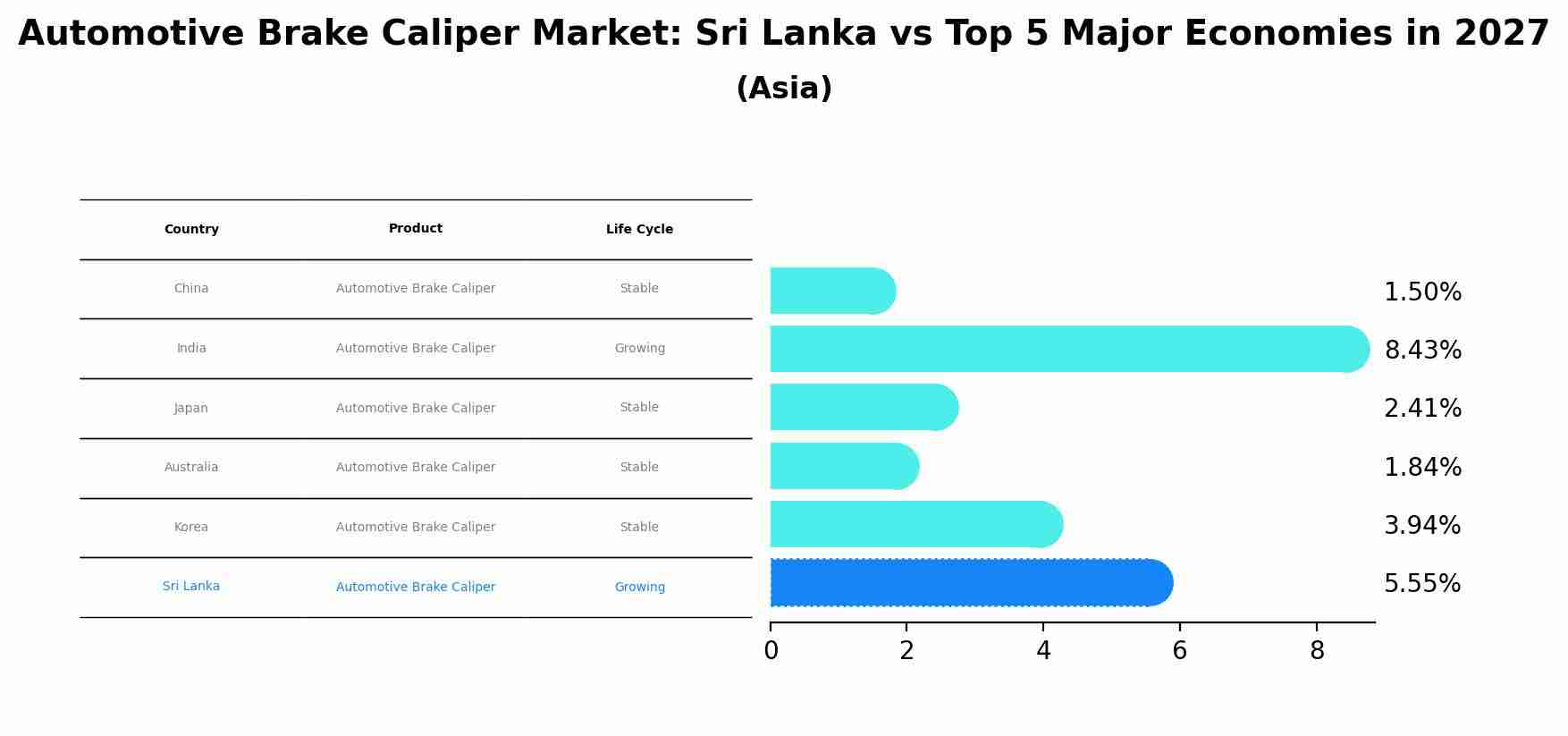Sri Lanka Automotive Brake Caliper Market Outlook | Industry, Forecast, Companies, COVID-19 IMPACT, Growth, Revenue, Trends, Share, Value, Size & Analysis
| Product Code: ETC362011 | Publication Date: Aug 2022 | Updated Date: Aug 2025 | Product Type: Market Research Report | |
| Publisher: 6Wresearch | Author: Summon Dutta | No. of Pages: 75 | No. of Figures: 35 | No. of Tables: 20 |
Sri Lanka Automotive Brake Caliper Market Size Growth Rate
The Sri Lanka Automotive Brake Caliper Market is projected to witness mixed growth rate patterns during 2025 to 2029. Starting at 7.79% in 2025, the market peaks at 7.92% in 2026, and settles at 4.65% by 2029.

Automotive Brake Caliper Market: Sri Lanka vs Top 5 Major Economies in 2027 (Asia)
The Automotive Brake Caliper market in Sri Lanka is projected to grow at a growing growth rate of 5.55% by 2027, within the Asia region led by China, along with other countries like India, Japan, Australia and South Korea, collectively shaping a dynamic and evolving market environment driven by innovation and increasing adoption of emerging technologies.

Sri Lanka Automotive Brake Caliper Market Synopsis
The Sri Lanka Automotive Brake Caliper Market is experiencing steady growth driven by increasing vehicle sales and a growing aftermarket segment. The market is characterized by a mix of domestic and international players offering a variety of products ranging from traditional to advanced brake calipers. Key trends shaping the market include the shift towards lightweight and durable materials, technological advancements such as electronic brake calipers, and a growing focus on safety and performance. The demand for automotive brake calipers is expected to further rise with the increasing vehicle fleet in Sri Lanka and the emphasis on vehicle safety standards. Market players are focusing on product innovation, strategic partnerships, and expansion of distribution networks to capitalize on the lucrative opportunities in the Sri Lankan automotive brake caliper market.
Sri Lanka Automotive Brake Caliper Market Trends
The Sri Lanka Automotive Brake Caliper Market is witnessing a shift towards lightweight and durable materials such as aluminum and carbon fiber to improve performance and fuel efficiency. Additionally, there is a growing demand for technologically advanced brake calipers equipped with electronic components for enhanced safety features like anti-lock braking systems (ABS) and electronic stability control (ESC). The market is also experiencing a rise in the adoption of electric vehicles, leading to a demand for regenerative braking systems that require specialized brake calipers. Overall, the focus on innovation, safety, and sustainability is driving the Automotive Brake Caliper Market in Sri Lanka towards more advanced and efficient solutions to meet the changing needs of consumers and regulatory standards.
Sri Lanka Automotive Brake Caliper Market Challenges
In the Sri Lanka Automotive Brake Caliper Market, several challenges are faced by industry players. One major challenge is the presence of counterfeit products in the market, which can pose safety risks to consumers and damage the reputation of genuine brands. Additionally, the lack of strict regulations and enforcement mechanisms in the automotive aftermarket sector contributes to the proliferation of low-quality brake calipers. Another challenge is the increasing competition from cheaper imported products, which can undermine the market share of local manufacturers. Moreover, fluctuations in raw material prices and supply chain disruptions can impact the cost of production and pricing strategies of brake caliper manufacturers in Sri Lanka. Overall, addressing these challenges will require a combination of regulatory reforms, quality control measures, and strategic marketing initiatives to ensure the sustainability and growth of the automotive brake caliper market in Sri Lanka.
Sri Lanka Automotive Brake Caliper Market Investment Opportunities
The Sri Lanka Automotive Brake Caliper Market presents opportunities for investment due to the growing automotive industry in the country driven by increasing consumer demand for vehicles. With a focus on vehicle safety and performance, there is a rising need for high-quality brake calipers in the market. Investing in manufacturing facilities, distribution networks, and technology advancements for brake calipers can be lucrative. Additionally, partnerships with local automotive manufacturers and suppliers can help leverage the market potential. As the government continues to promote the automotive industry and improve infrastructure, investing in the Sri Lanka Automotive Brake Caliper Market can provide long-term growth prospects for investors looking to capitalize on the expanding automotive sector in the country.
Jordan Agar Market Government Policies
The Sri Lankan government has implemented various policies and regulations related to the Automotive Brake Caliper Market to ensure safety and quality standards in the automotive industry. These policies include mandatory adherence to safety standards set by the Department of Motor Traffic, periodic inspections and certifications for vehicles, and strict enforcement of regulations related to the manufacturing and installation of brake calipers. Additionally, the government encourages the use of eco-friendly and energy-efficient brake calipers to reduce environmental impact. Import regulations and tariffs may also influence the market dynamics by affecting the cost and availability of brake calipers in Sri Lanka. Overall, the government`s focus on safety, quality, and environmental sustainability plays a significant role in shaping the Automotive Brake Caliper Market in Sri Lanka.
Sri Lanka Automotive Brake Caliper Market Future Outlook
The Sri Lanka Automotive Brake Caliper Market is expected to witness steady growth in the coming years due to factors such as increasing vehicle sales, growing awareness about vehicle safety, and advancements in automotive technology. The market is likely to be driven by a higher demand for disc brakes over drum brakes, as disc brakes are known for their superior performance and safety features. Additionally, the rising trend of electric vehicles in the region is expected to create opportunities for innovative brake caliper solutions. However, challenges such as fluctuating raw material prices and stringent regulations on vehicle emissions may impact market growth. Market players can focus on product innovation, strategic partnerships, and expanding their distribution networks to capitalize on the growing demand for automotive brake calipers in Sri Lanka.
Key Highlights of the Report:
- Sri Lanka Automotive Brake Caliper Market Outlook
- Market Size of Sri Lanka Automotive Brake Caliper Market, 2021
- Forecast of Sri Lanka Automotive Brake Caliper Market, 2031
- Historical Data and Forecast of Sri Lanka Automotive Brake Caliper Revenues & Volume for the Period 2018 - 2031
- Sri Lanka Automotive Brake Caliper Market Trend Evolution
- Sri Lanka Automotive Brake Caliper Market Drivers and Challenges
- Sri Lanka Automotive Brake Caliper Price Trends
- Sri Lanka Automotive Brake Caliper Porter's Five Forces
- Sri Lanka Automotive Brake Caliper Industry Life Cycle
- Historical Data and Forecast of Sri Lanka Automotive Brake Caliper Market Revenues & Volume By Vehicle Type for the Period 2018 - 2031
- Historical Data and Forecast of Sri Lanka Automotive Brake Caliper Market Revenues & Volume By Passenger Cars for the Period 2018 - 2031
- Historical Data and Forecast of Sri Lanka Automotive Brake Caliper Market Revenues & Volume By Commercial Vehicles for the Period 2018 - 2031
- Historical Data and Forecast of Sri Lanka Automotive Brake Caliper Market Revenues & Volume By Two-wheelers for the Period 2018 - 2031
- Historical Data and Forecast of Sri Lanka Automotive Brake Caliper Market Revenues & Volume By Caliper Type for the Period 2018 - 2031
- Historical Data and Forecast of Sri Lanka Automotive Brake Caliper Market Revenues & Volume By Fixed for the Period 2018 - 2031
- Historical Data and Forecast of Sri Lanka Automotive Brake Caliper Market Revenues & Volume By Floating/Sliding for the Period 2018 - 2031
- Historical Data and Forecast of Sri Lanka Automotive Brake Caliper Market Revenues & Volume By Piston Material Type for the Period 2018 - 2031
- Historical Data and Forecast of Sri Lanka Automotive Brake Caliper Market Revenues & Volume By Aluminum for the Period 2018 - 2031
- Historical Data and Forecast of Sri Lanka Automotive Brake Caliper Market Revenues & Volume By Steel for the Period 2018 - 2031
- Historical Data and Forecast of Sri Lanka Automotive Brake Caliper Market Revenues & Volume By Titanium for the Period 2018 - 2031
- Historical Data and Forecast of Sri Lanka Automotive Brake Caliper Market Revenues & Volume By Phenolics for the Period 2018 - 2031
- Historical Data and Forecast of Sri Lanka Automotive Brake Caliper Market Revenues & Volume By End User for the Period 2018 - 2031
- Historical Data and Forecast of Sri Lanka Automotive Brake Caliper Market Revenues & Volume By OEM for the Period 2018 - 2031
- Historical Data and Forecast of Sri Lanka Automotive Brake Caliper Market Revenues & Volume By Aftermarket for the Period 2018 - 2031
- Sri Lanka Automotive Brake Caliper Import Export Trade Statistics
- Market Opportunity Assessment By Vehicle Type
- Market Opportunity Assessment By Caliper Type
- Market Opportunity Assessment By Piston Material Type
- Market Opportunity Assessment By End User
- Sri Lanka Automotive Brake Caliper Top Companies Market Share
- Sri Lanka Automotive Brake Caliper Competitive Benchmarking By Technical and Operational Parameters
- Sri Lanka Automotive Brake Caliper Company Profiles
- Sri Lanka Automotive Brake Caliper Key Strategic Recommendations
Frequently Asked Questions About the Market Study (FAQs):
- Single User License$ 1,995
- Department License$ 2,400
- Site License$ 3,120
- Global License$ 3,795
Search
Thought Leadership and Analyst Meet
Our Clients
Related Reports
- Germany Breakfast Food Market (2026-2032) | Industry, Share, Growth, Size, Companies, Value, Analysis, Revenue, Trends, Forecast & Outlook
- Australia Briquette Market (2025-2031) | Growth, Size, Revenue, Forecast, Analysis, Trends, Value, Share, Industry & Companies
- Vietnam System Integrator Market (2025-2031) | Size, Companies, Analysis, Industry, Value, Forecast, Growth, Trends, Revenue & Share
- ASEAN and Thailand Brain Health Supplements Market (2025-2031) | Strategy, Consumer Insights, Analysis, Investment Trends, Opportunities, Growth, Size, Share, Industry, Revenue, Segments, Value, Segmentation, Supply, Forecast, Restraints, Outlook, Competition, Drivers, Trends, Demand, Pricing Analysis, Competitive, Strategic Insights, Companies, Challenges
- ASEAN Bearings Market (2025-2031) | Strategy, Consumer Insights, Analysis, Investment Trends, Opportunities, Growth, Size, Share, Industry, Revenue, Segments, Value, Segmentation, Supply, Forecast, Restraints, Outlook, Competition, Drivers, Trends, Demand, Pricing Analysis, Competitive, Strategic Insights, Companies, Challenges
- Europe Flooring Market (2025-2031) | Outlook, Share, Industry, Trends, Forecast, Companies, Revenue, Size, Analysis, Growth & Value
- Saudi Arabia Manlift Market (2025-2031) | Outlook, Size, Growth, Trends, Companies, Industry, Revenue, Value, Share, Forecast & Analysis
- Uganda Excavator, Crane, and Wheel Loaders Market (2025-2031) | Strategy, Consumer Insights, Analysis, Investment Trends, Opportunities, Growth, Size, Share, Industry, Revenue, Segments, Value, Segmentation, Supply, Forecast, Restraints, Outlook, Competition, Drivers, Trends, Demand, Pricing Analysis, Competitive, Strategic Insights, Companies, Challenges
- Rwanda Excavator, Crane, and Wheel Loaders Market (2025-2031) | Strategy, Consumer Insights, Analysis, Investment Trends, Opportunities, Growth, Size, Share, Industry, Revenue, Segments, Value, Segmentation, Supply, Forecast, Restraints, Outlook, Competition, Drivers, Trends, Demand, Pricing Analysis, Competitive, Strategic Insights, Companies, Challenges
- Kenya Excavator, Crane, and Wheel Loaders Market (2025-2031) | Strategy, Consumer Insights, Analysis, Investment Trends, Opportunities, Growth, Size, Share, Industry, Revenue, Segments, Value, Segmentation, Supply, Forecast, Restraints, Outlook, Competition, Drivers, Trends, Demand, Pricing Analysis, Competitive, Strategic Insights, Companies, Challenges
Industry Events and Analyst Meet
Whitepaper
- Middle East & Africa Commercial Security Market Click here to view more.
- Middle East & Africa Fire Safety Systems & Equipment Market Click here to view more.
- GCC Drone Market Click here to view more.
- Middle East Lighting Fixture Market Click here to view more.
- GCC Physical & Perimeter Security Market Click here to view more.
6WResearch In News
- Doha a strategic location for EV manufacturing hub: IPA Qatar
- Demand for luxury TVs surging in the GCC, says Samsung
- Empowering Growth: The Thriving Journey of Bangladesh’s Cable Industry
- Demand for luxury TVs surging in the GCC, says Samsung
- Video call with a traditional healer? Once unthinkable, it’s now common in South Africa
- Intelligent Buildings To Smooth GCC’s Path To Net Zero


















